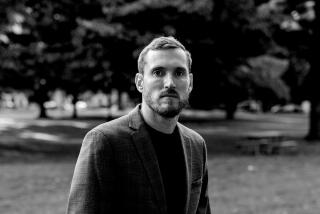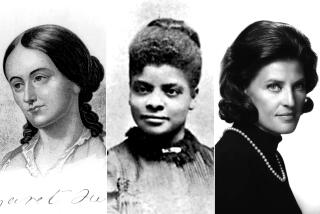From Park Avenue to Afghanistan War : Ladies’ Home Journal Editor Defies Moscow to Report on a Distant Conflict
- Share via
NEW YORK — The April Ladies’ Home Journal has the usual celebrity cover, the mandatory monthly teasers for “the 15 most requested recipes,” “what makes couples stay in love,” “fashions that make you look younger and thinner” and “hair styles of the rich and famous.”
It also contains a first-person story of war in a faraway country: 2 million deaths, 5 million refugees, unthinkable atrocities against children and the civilian population of Afghanistan in general.
Defying the Kremlin
What makes this excerpt from “Caught in the Crossfire” (E. P. Dutton: $18.95), by Ladies’ Home Journal executive editor Jan Goodwin, all the more dramatic is the way Goodwin defied a Kremlin ban on reporting the war that began with the Soviet invasion of Afghanistan in 1979. Dressed in native garb and disguised as a man, her bright red hair dyed black and wrapped in a turban, Goodwin smuggled herself across the border from Pakistan and spent three months following a group of Afghan freedom fighters through 10 of that country’s 28 provinces.
“Try to put your feet where I put my feet,” Goodwin’s guerrilla guide advised her as she followed him across the high Afghan desert. Goodwin pondered this suggestion and realized that in an area heavily mined by the Soviets, “19-year-old Tor was acting as a human mine-sweeper for me.”
Afghanistan’s Hidden War
Back to her flyaway red curls and her persona as a top-ranking editor of a women’s slick magazine with a monthly circulation of more than 5 million, Goodwin sat in her Park Avenue office last week and talked about the “hidden war” in Afghanistan. Idly, Goodwin fingered a defused butterfly bomb, a “show-and-tell” gift to her from a member of the Afghan resistance.
“This thing could blow off an arm or a leg,” Goodwin said of the small plastic device that resembles its namesake. “The Soviets blanket the country with these.” Goodwin offered an ironic smile. “They blend in beautifully with the rock terrain.”
A former Fleet Street journalist, Goodwin, 43, had covered wars in Israel, Cambodia and El Salvador by the time she crept across the border into Afghanistan. While days at the Journal might find her negotiating with Buckingham Palace for a cover story on Princess Diana or panting at the prospect of an interview with Barbra Streisand, Goodwin early on had distinguished herself as something of a different duck in the ladies’ magazine pack.
When her magazine sent her to interview Mother Theresa, Goodwin decided she would understand the Nobel Prize winner if she worked alongside her in the streets of Calcutta for a week. Her passion on the subject of child pornography is so fierce that colleagues make jokes about “Jan Goodwin’s campaign” against it. On the occasion of her 40th birthday, Goodwin politely turned down an invitation to dine at Le Cirque, preferring instead to go sky diving for the first time.
As a member of Rosalynn Carter’s National Cambodia Crisis Committee, Goodwin was well-placed, and theoretically well-versed in the world refugee relief community. Still, she blanched one particularly gray day in March three years ago when a friend from that circle appeared in her office and delivered some disturbing data.
Millions of Refugees
Afghanistan had a prewar population of 15 million, Goodwin was told. Now, in addition to the estimated 2 million dead, there were an estimated 5 million external Afghan refugees and nearly 2 million refugees within the country. The deadline copy lying on her desk suddenly lost its urgency when Goodwin heard that 50% of the world’s refugees were now Afghan.
But with its Kremlin-issued news blackout, the war in Afghanistan is especially hard to cover. Unlike Central America, Vietnam or the Middle East, television crews can’t pulse the fighting into American living rooms at supper time.
Besides, as Goodwin soon realized, Afghanistan is “as a country, too far away. People think ‘who cares?’ ”
In fact, so distant is this Texas-sized land of 24,000-foot mountains that, Goodwin said, “I’ve had educated people say to me, ‘I know what an Afghan dog looks like, but I don’t know what an Afghan person looks like.’ ”
Traipsing with the rebels for three months, Goodwin too found herself in surroundings that were hardly Hilton-like. Food was scarce; the pace was quick and grueling for a “non-athletic, very non-athletic” woman who admits that in Manhattan, she’ll readily take a cab before she walks 10 blocks. Traveling with men in a rigidly Muslim culture, Goodwin seldom bathed, much less changed clothes. By the end of her stay in Afghanistan, Goodwin was 30 pounds thinner and wracked with a case of amoebic dysentery.
At least one rebel faction refused to let Goodwin come along. A 40-year-old female American journalist could only hold them back, they argued. But the band of fighters who did accept Goodwin recognized the value of telling the world what was happening in their war-torn country.
“It was a two-way trust between us,” Goodwin said. “My life was in their hands and their story was in mine.”
Rage Cushioned Her Fear
Goodwin concedes she was often frightened in Afghanistan, and recalls the way an associate recoiled when she asked her to witness her will shortly before she left. But Goodwin was incensed at the obliteration of human rights in Afghanistan and that rage helped cushion her fear. Said Goodwin, “I was propelled by my anger.”
Hardy, Goodwin said, might be one description of the inhabitants of the only nation to repel Genghis Khan. When the Soviets first rolled into Afghanistan, “nobody expected the freedom fighters to hold out more than a couple of weeks,” she said. Eight years later, Mikhail Gorbachev himself was describing the conflict as a “bleeding wound” in the side of his country.
One tireless enemy for the Soviet troops is the harsh topography of Afghanistan.
Drugs too have scored a blow against the Soviet forces. “I saw marijuana plants taller than I am,” said Goodwin. In some parts of Afghanistan, she went on, “opium poppies could be the national flower.”
Toy Trucks That Main
The human side of the war was what Goodwin wanted to convey in her book. “War is about everyday existence,” she said, “people whose lives are changed forever, not politics and State Department pipelines.”
She writes, for example, of the 10- to 15-year-old Afghan children she said are forcibly separated from their parents and shipped off for years of indoctrination in the Soviet Union. Or there are the mutilated children Goodwin saw in Afghanistan, maimed by colorful bombs shaped like toy trucks or birds.
The atrocities were painfully reminiscent of other battles against tyranny. But as Goodwin pointed out, “With Pol Pot, with Hitler, with Idi Amin, we were told it was the work of a madman. With the Kremlin, it is not one man and we must assume they are not mad.”
Strong stuff, but Goodwin insists that “I am not anti-Soviet. What I am is anti-atrocity, and I don’t care who is perpetrating those atrocities.”
In reporting the war in Afghanistan, Goodwin said she was intent equally on “de-romanticizing” the seven major resistance groups.
“So often,” she said, “they are made out to be romantic figures, like Douglas Fairbanks or Che Guevara.” Rather, said Goodwin, “one of the leaders that I traveled with was a Ph. D. candidate. They were real people, people who hurt, people who cry, feel love and want the same kinds of things for their children that we want for ours.”
We’re a Global Village
Such universality, Goodwin contends, is why this distant war must not be ignored.
“We are truly a global village,” Goodwin said. “Nothing happens in isolation in this modern world.
“Maybe I just have a curious sense of justice,” she went on. “But if we are going to be part of this world, it seems to me that we have to become concerned about atrocities being carried out against the civilian population, women and children.”
Before completing her book, Goodwin traveled to the Soviet Union (using her British passport and identifying herself as a schoolteacher) to talk to people there about Afghanistan. She allowed friends from the Afghan resistance living in America to examine her manuscript, “almost like fact checkers,” because “I wanted to make sure that nothing I said was going to cost any of their lives.”
Already, Goodwin has been invited to testify at congressional hearings on Afghanistan. She is raising her voice against what she labels a “curtain of silence,” giving in to what she calls “the Robin Hood quality in me.” Goodwin laughed: “It’s not robbing the rich. It’s righting the wrongs.”
For that matter, one of the things that made Goodwin determined to report on Afghanistan after she learned of the actual toll in human life there was an old saying from the Royal Air Force, “You can only fly a desk so long.”
When she came home to New York and prepared to hole up for an intense six months of writing her book, Goodwin was greeted with an inspirational message of another kind.
“The reasonable man adapts himself to the world, the unreasonable one persists in trying to adapt the world to himself,” reads the quote from George Bernard Shaw taped to her typewriter. “Therefore, all progress depends on the unreasonable man.”
Said Goodwin, smiling, “I guess I’m an unreasonable woman.”
More to Read
Sign up for Essential California
The most important California stories and recommendations in your inbox every morning.
You may occasionally receive promotional content from the Los Angeles Times.













